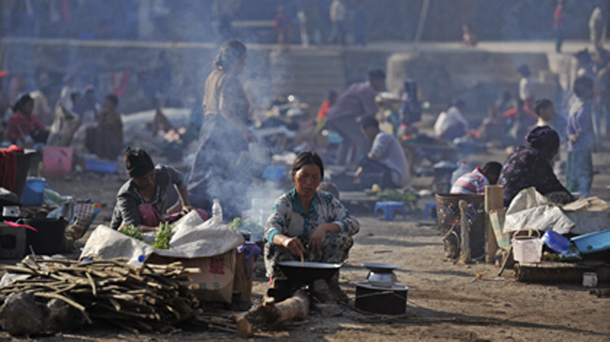RANGOON — A Kachin State court on Thursday handed down prison sentences of five years each to two ethnic Kachin men for allegedly attempting to blow up a government office with a truck bomb in the state capital Myitkyina in 2012, according to the men’s lawyer.
Lapai Gun, 52, and Brang Yung, 25, are both already serving two-year prison sentences after being convicted alongside two others under the Unlawful Associations Act last month. All four have denied they are linked to the Kachin Independence Army (KIA), which has been fighting the Burma Army in the country’s far north since a ceasefire broke down in 2011.
The men have been detained since they were arrested in June 2012 at a camp near Myitkyina for Kachin displaced by fighting. The arrest came shortly after a truck exploded in the parking lot of an administrative building in the state capital, without damaging the office.
Ethnic Kachin lawyer Mar Khar said the Myitkyina court found Lapai Gun and Brang Yung guilty of planting the bomb in the truck, and sentenced them to another five years in prison.
“The judge, U Ne Lin, said the court found enough evidence to convict the two detainees for blowing up the bomb in the truck,” he said.
However, Mar Khar said that the court only listened to evidence from the police, and rejected evidence he tried to put forward in defense of his clients.
“The police did not have enough evidence to prove the blast,” he said. “I even asked the police how do they know about the two persons setting the bomb, or to show some strong evidence, but the police could not tell me.”
Brang Yung is also accused of another six crimes, and Lapai Gun is still facing four charges, according to the lawyer.
The inmates have claimed that they suffered abuse—including being forced to perform sexual acts and humiliating dances—while in the custody of the Burma Army’s Infantry Battalion No. 37, which is based in Thar Lao Gyi, a village in Myitkyina Township.
Mar Khar said the court had rejected the inmate’s accusations of mistreatment.
“They are just civilians and innocent people,” Mar Khar insisted. “The judge even knew this, but the judge ignored the rule of law and sentenced to these two people.”
The two are among scores of Kachin arrested since fighting resumed in the state. Rights groups say they have documented numerous cases of Burmese authorities using the 1908 Unlawful Associations Act to target ethnic Kachin during the conflict. Article 17 of the law sets harsh punishments for anyone with even daring to have contact with groups with political aims.
President Thein Sein has said that Burma will release all political prisoners by the end of the year and a number of prisoners of conscience have been released in conditional amnesties. But critics note the increasing use detention of protesters and activists—with many charged under the Peaceful Assembly Law, which outlaws protesting without permission from the authorities.
And Kachin detainees will likely remain in prison as the court continues to add extra charges, said Mar Khar, adding that prosecutors were still investigating to find more charges against Lapai Gun and Brang Yung. In total 14 Kachin are currently detained under the Unlawful Associations Act, he said.
In a joint letter to US President Barack Obama on Thursday, a coalition of 40 local and international nongovernmental organizations said Thein Sein’s pledge to release all political prisoners was discredited, since the Burmese authorities were still using detention against political opponents.
“Due to ongoing detentions of activists, farmers, and ethnic minorities across Burma, it is necessary for your Administration to take immediate, pro-active steps to hold the Burmese government to its commitment to promptly release all political prisoners,” the letter said, recommending that pressure is put on the Burma government to unconditionally release all political prisoners and to repeal draconian laws used against activists.

















